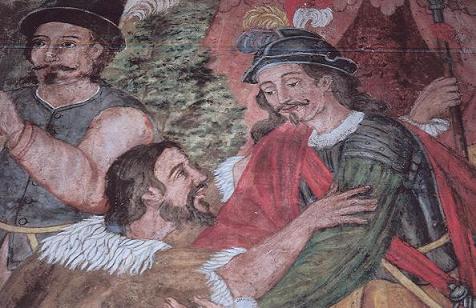Kingdom of the Canary Islands on:
[Wikipedia]
[Google]
[Amazon]
The Kingdom of the Canary Islands was a
 Jean de Béthencourt was, after his death, succeeded by his nephew Maciot de Béthencourt, who turned out to be a tyrant. He established Teguise as the new capital. The Portuguese had been competing with the Castilians for the islands. The Castilians suspected that Maciot would sell the islands to them, which he did in 1448. Neither the natives nor the Castilians approved, and this led to a revolt which lasted until 1459 when the Portuguese were forced to leave. Portugal formally recognised Castile as the ruler of the Canary Islands in 1479 as part of the Treaty of Alcáçovas.
The military governor Alonso Fernández de Lugo finally conquered the islands of La Palma (in 1492–1493) and Tenerife (in 1494–1496) for the
Jean de Béthencourt was, after his death, succeeded by his nephew Maciot de Béthencourt, who turned out to be a tyrant. He established Teguise as the new capital. The Portuguese had been competing with the Castilians for the islands. The Castilians suspected that Maciot would sell the islands to them, which he did in 1448. Neither the natives nor the Castilians approved, and this led to a revolt which lasted until 1459 when the Portuguese were forced to leave. Portugal formally recognised Castile as the ruler of the Canary Islands in 1479 as part of the Treaty of Alcáçovas.
The military governor Alonso Fernández de Lugo finally conquered the islands of La Palma (in 1492–1493) and Tenerife (in 1494–1496) for the
{{DEFAULTSORT:Canary Islands, Kingdom of the 15th-century disestablishments in Africa 15th-century establishments in Africa Former countries in Africa Former vassal states History of the Canary Islands Invasions by the Normans States and territories established in 1402 States and territories disestablished in 1448 category:Former kingdoms Island countries
vassal state
A vassal state is any state that has a mutual obligation to a superior state or empire, in a status similar to that of a vassal in the feudal system in medieval Europe. Vassal states were common among the empires of the Near East, dating back to ...
of the Crown of Castile
The Crown of Castile was a medieval polity in the Iberian Peninsula that formed in 1230 as a result of the third and definitive union of the crowns and, some decades later, the parliaments of the kingdoms of Castile and León upon the accessi ...
located in North Africa, lasting from 1404 to 1448.
First contact by Europeans
Apart from earlier contact by Romans, one of the first known Europeans to have encountered the Canaries was the Genoan navigator Lancelotto Malocello. He arrived on the island ofLanzarote
Lanzarote (, , ) is a Spanish island, the easternmost of the Canary Islands in the Atlantic Ocean. It is located approximately off the north coast of Africa and from the Iberian Peninsula. Covering , Lanzarote is the fourth-largest of the i ...
(which was probably named after him) in 1312 and stayed for almost two decades until he was expelled during a revolt by the native Guanche under the leadership of their king Zonzamas.
Conquest
The conquest of the Canaries was started in 1402 by French- Norman explorer Jean de Béthencourt. He had set sail from France one year earlier with a small army. He started the conquest in a rather friendly way by taking over the island of Lanzarote with the help of the locals. They would soon also takeFuerteventura
Fuerteventura () is one of the Canary Islands, in the Atlantic Ocean, part of the North Africa region, and politically part of Spain. It is located away from the northwestern coast of Africa. The island was declared a biosphere reserve by UNES ...
and El Hierro. Their present king Guadarfia was the grandson of Zonzamas, who was king when Lancelotto Malocello had visited the island earlier.
When Béthencourt left the island for reinforcements from Castile, unrest broke out because of fighting between Norman officer Gadifer de la Salle and Berthin, in which the natives had been involved. However, Béthencourt managed to calm the situation when he returned, and the Guanche leader was baptized on February 27, 1404, thus surrendering to the Europeans. Subsequently, Jean de Béthencourt was proclaimed king of the Canaries by Pope Innocent VII, even though he recognized the Castilians as overlords. The remaining islands, La Gomera, Gran Canaria, Tenerife and La Palma, were gradually conquered over the course of a century or so.
Crown of Castile
The Crown of Castile was a medieval polity in the Iberian Peninsula that formed in 1230 as a result of the third and definitive union of the crowns and, some decades later, the parliaments of the kingdoms of Castile and León upon the accessi ...
, thus completing the conquest of the island group.
Sources
{{DEFAULTSORT:Canary Islands, Kingdom of the 15th-century disestablishments in Africa 15th-century establishments in Africa Former countries in Africa Former vassal states History of the Canary Islands Invasions by the Normans States and territories established in 1402 States and territories disestablished in 1448 category:Former kingdoms Island countries